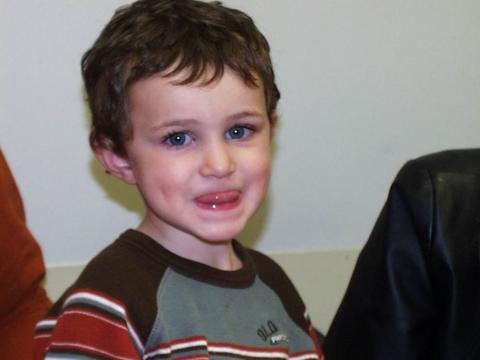Blog and News
Blog & News
It's all about the babies
-
 Gage is off to a great start thanks to newborn screening
Gage is off to a great start thanks to newborn screeningDo you remember the first time you held a newborn? Maybe she was your baby, just minutes old. Maybe she was a niece or part of your extended family who you helped welcome into the world.
I remember the first time I held my child. At that moment everything else completely faded into the background. It was all about the miracle of a new life in my arms – my baby daughter. While I was caught up in the early days of mommy euphoria (and my husband likewise captivated), I vaguely remember the flurry of activity by the nurses. Of course, I remember our “Baby Dana” was given an APGAR score, which rated her activity, pulse, grimace appearance and respiration right after delivery.
At the time I did not realize that, wrapped up in this miracle of birth, were many other steps underway to ensure that Dana was off to a healthy start. I remember a nurse taking my new baby to the nursery for a test and then bringing her back with a tiny bandage on her tiny foot. It was, of course, the heel prick test where a few drops of blood are collected to screen for congenital and often life-threatening conditions.
For us, it was an uneventful test, and we forgot it as quickly as the bandage fell off Dana’s heel. Most families have similar experiences and may never think about that first test again, until the next baby and the next tiny bandage. For other families, though, it is the pivotal screen that saves their babies from a life of profound developmental delays and other complications that sometimes shorten their lives. It becomes a test that they likely will never forget.
Six years ago, I began working at the State Hygienic Laboratory, which performs newborn screening for babies born in Iowa, North Dakota and South Dakota. I learned what happened to those drops of blood from my children’s feet, and just how critical the newborn screening test is. My lesson can be summed up in the story of Gage, a baby born in 2002.
It was a particularly busy year for the dedicated, talented staff that performs newborn screening at Iowa’s State Hygienic Laboratory. By the way, I cannot say enough good things about these folks. They live by a motto that program manager Stanton Berberich, Ph.D., often shares: “It’s all about the babies.”
Anyway, the Lab was scheduled to add Biotinidase deficiency to its screening panel and had established a timeline for incorporating the new methods and protocols needed to begin screening. Babies born with Biotinidase deficiency will appear healthy at birth, but if left undetected and untreated, the congenital condition can cause seizures, low muscle tone, hearing and vision loss, and profound developmental delays, among other complications. If detected early in life by newborn screening, taking biotin supplements can prevent all of these complications.
As the start date for Biotinidase deficiency screening was approaching, several large issues emerged that created challenges. The original timeline now seemed unrealistic. Stan decided to postpone the start date to give his team more time to resolve these issues. He announced the delay to his staff, reminding them that Biotinidase deficiency, after all, is very rare and only occurs in about one in 60,000 births. In Iowa, where about 40,000 babies are born each year, it was very unlikely that the Lab would receive a true positive specimen during the short period of postponement.
A scientist who had worked in the lab for many years, understood that Stan did not want to overstress the program or the staff by implementing the additional screen amidst so many other challenges. She felt strongly, though, that screening should begin as planned. She told Stan that she would do whatever she could to bring the new screening online, even if it meant that she put in the extra time and energy to make it happen.
And he listened. Buoyed by the resolve of his staff, Stan and team moved ahead, putting in extra hours so screening for Biotinidase deficiency could begin as originally planned.
Within the first week after the screen was added, the state lab had a presumptive positive screen that ended up being confirmed as a true positive. A baby named Gage became Iowa’s first case of Biotinidase deficiency detected through newborn screening. Because his family knew of his condition, Gage received the prescribed therapy and went on to have a healthy childhood. If the condition had not been detected and treated, Gage’s prognosis would have been much different.
It was a lesson that left an indelible impression on the team and on its manager. “No matter how rare a disorder may be – even one in 60,000 – you never know if the next baby might be that one baby with the true positive result,” Stan said.
It was a powerful lesson for me, too, to learn about Gage and the difference a few drops of blood can make in the hands of our newborn screening team. Gage, like my Dana, enjoyed a healthy childhood thanks to the newborn screening program.
The next time I am blessed to hold a newborn in my arms, I am quite sure that I will be overwhelmed by that same sense of wonder. I hope, though, that I remember Stan, his team and every laboratorian who saves babies through newborn screening. Such work is truly miraculous.
Note: In 2013, newborn screening celebrates its 50th year in the United States. Hats off to the entire community of scientists, families and supporters, including BabysFirstTest.org!
2 Comments
Comment on This Post